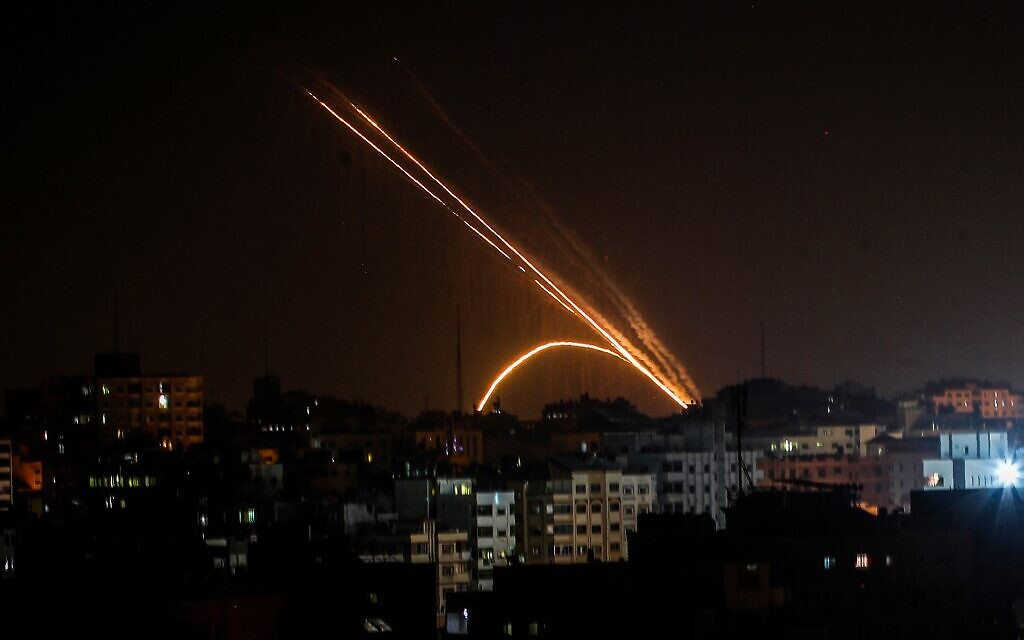Australia/Israel Review
Behind the News – January 2020
Dec 18, 2019 | AIJAC staff

Rocket and Terror Report
According to statistics from the Israeli security agency Shin Bet, more than 2,600 rockets and mortars have been fired at Israel from Gaza over the past two years. More than half of these were fired in the past year, including approximately 560 rockets fired by Palestinian Islamic Jihad following Israel’s assassination of senior commander Baha Abu al-Ata on Nov. 12. The IDF has struck about 1,000 targets in Gaza in the past year in response.
More than two dozen missiles have also been fired at Israel from Syria in 2019, including four on Nov. 19.
During late November and early December, one mortar and six rockets were launched at Israel from Gaza in four separate incidents, causing no damage or casualties. Israel launched retaliatory strikes on multiple Hamas targets in Gaza.
“Great March of Return” protests resumed on the Gaza border on Dec. 6 after a three-week pause.
In the West Bank, near-daily violent incidents against soldiers and civilians continue.
Abbas calls for Palestinian general elections
Fourteen years into his four-year term as President of the Palestinian Authority (PA), Mahmoud Abbas announced on Dec. 10 that general elections will be held next year.
The elections were called after a majority of Palestinian factions, including Hamas, agreed to go to the polls next year. Palestinian Islamic Jihad and a small number of other Palestinian terror groups oppose the elections.
The 2020 elections will be held separately for each of the three governmental bodies – the Presidency, the Palestinian Legislative Council and the Palestinian National Council. The last presidential and parliamentary elections were held in 2005 and 2006 respectively.
In addition to Palestinians voting in the West Bank and Gaza Strip, the PA has submitted an official request to Israel to allow Palestinian residents of east Jerusalem to participate in the elections, as previously agreed to in 1996, 2005 and 2006.
Iran under economic pressure, fined by US Court
According to US financial intelligence, the Iranian government is experiencing a more severe shortfall in foreign-exchange reserves than previously thought, with a 70% fall in oil exports to only 500,000 barrels a day, less than half of the 2013 level.
Iran’s trade deficit has reportedly risen to 3% of its gross domestic product (GDP).
Meanwhile, on Nov. 22, the United States District Court of Columbia, ordered Iran to pay close to US $180 million in damages to Washington Post reporter Jason Rezaian for psychological torture and physical abuse he suffered while imprisoned in Iran for 18 months.
Iran developing nuclear-capable missiles
In the leadup to an upcoming UN Security Council meeting on Iran, the European signatories of the 2015 nuclear deal (JCPOA) notified the UN Secretary-General on Dec. 4 that Teheran had violated the UN Security Council resolution which implemented that agreement by developing ballistic missiles capable of carrying a nuclear payload.
The same day, Russia’s national nuclear company, Rosatom, suspended its work at Iran’s Fordow plant because uranium enrichment activities conducted there in breach of the agreement have rendered impossible redesigning and repurposing the facility as required by the JCPOA.
On Nov. 27, France’s Foreign Minister, Jean-Yves Le Drian, warned that Paris is considering referring Iran’s breaches of the JCPOA to the dispute resolution mechanism embedded in the agreement. If unresolved, this process could be escalated to the UN Security Council, which can, within 30 days, reimpose all UN sanctions on Iran that were frozen following the deal.
Despite all this, on Dec.1, six European countries (Belgium, Denmark, Finland, the Netherlands, Norway and Sweden) joined the INSTEX barter-based trade system designed to circumvent US sanctions on Iran.
Hezbollah in Germany
A Nov. 29 report in Berlin newspaper Taggesspiel claimed Hezbollah is using Germany as its main European hub to recruit members, spread propaganda and raise funds via both legitimate and criminal enterprises, including drug trafficking and money laundering. The money is then sent to Lebanon to fund attacks and for arms procurement. According to intelligence reports, about 30 mosques and cultural centres across Germany have links to Hezbollah, which has approximately 1,050 identified members and supporters in the country.
Dutch double down
Following Australia’s lead, the Netherlands Parliament on Nov. 20 voted to stop directly funding the Palestinian Authority (PA).
The Dutch had been in discussions with the PA for 12 months about ending its “pay for slay” program, which sees imprisoned Palestinians terrorists, or their families, receive stipends from the PA for carrying out terror attacks against Israelis.
The Netherlands will now redirect one and a half million euros in aid towards Palestinian projects that strengthen law and human rights in the West Bank and Gaza.
On Nov. 19, the Dutch Parliament voted to express its opposition to a recent European Court of Justice ruling that products manufactured beyond the 1948 armistice lines cannot be labelled “Made in Israel”.
French Parliament adopts IHRA definition of antisemitism
The French Parliament passed a resolution on Dec. 3 to adopt the definition of antisemitism issued by the International Holocaust Remembrance Alliance (IHRA). The resolution, passed by 154 votes to 72 against, was tabled by Sylvain Maillard from President Emmanuel Macron’s centrist La Republique en Marche party. France has the world’s third-largest Jewish community, and in 2018 it saw a 74% rise in antisemitic incidents.
The introduction to the resolution included the following statement: “Anti-Zionist acts can sometimes obscure anti-Semitic realities. Criticising the very existence of Israel as a collective composed of Jewish citizens is tantamount to hatred towards the Jewish community as a whole; just like collectively holding Jews accountable for the policies of the Israeli authorities is an expression of antisemitism.” However, the resolution, like the IHRA definition, also notes that “pointing out such abuses in no way prevents otherwise free criticism of the Israeli government’s policies and positions.”
To date, 18 countries have adopted the IHRA definition of antisemitism.
Arabs against boycotting Israel
A groundbreaking two-day conference was held in London on Nov. 19 and 20 in which 30 representatives of Arab civil society from 15 countries called for the end of Israel’s isolation in the Arab world. The group called itself the “Arab Council for Regional Integration” and rejects the Boycott, Divestment and Sanctions movements (BDS), arguing it has caused more harm than good. “Arabs are the boycott’s first – and only – victims,” Egyptian attorney Eglal Gheita reportedly told attendees.
Other prominent participants in the conference included Egyptian MP Mohammed Anwar Sadat, nephew of the late president Anwar Sadat and leader of Egypt’s Reform and Development Party; former Kuwaiti Minister of Information Sami Abdul-Latif Al-Nisf; Hassen Chalghoumi, a Paris-based Tunisian cleric; Lebanese Imam Saleh Hamed; and Palestinian academic Mohammed Dajani, who famously took a group of his students to visit Auschwitz.
Direct Tel Aviv-Melbourne flights in 2020

Direct flights from Australia to Israel will soon be a reality
Israel’s national airline, El Al, announced on Dec. 10 that, as a trial, it will operate three direct round-trip flights between Tel Aviv and Melbourne during April and May 2020. The purpose of these flights, using the long-range Boeing 787 Dreamliners, is to examine the viability of opening a regular non-stop service between the two cities. The route would be the longest flown to and from Israel – 16 hours and 15 minutes to Melbourne, with the return flight 90 minutes longer.
Tags: Antisemitism, Europe, Hezbollah, Iran, Israel, Palestinians






